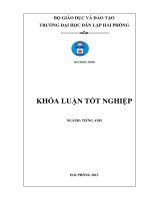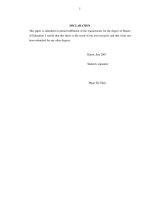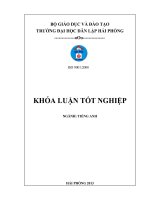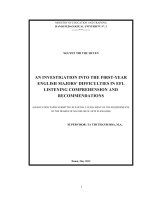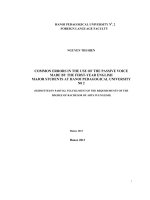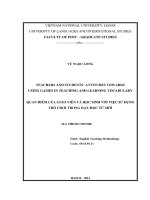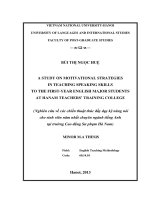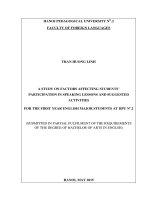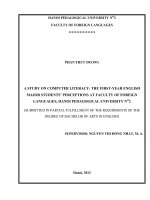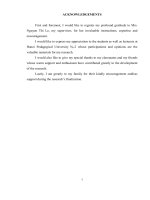The effectiveness of using games in teaching vocabulary for the first year english language teaching education students of foreign language faculty at hanoi pedagogical university 2 (2017)
Bạn đang xem bản rút gọn của tài liệu. Xem và tải ngay bản đầy đủ của tài liệu tại đây (727.15 KB, 78 trang )
HANOI PEDAGOGICAL UNIVERSITY 2
FOREIGN LANGUAGE FACULTY
TRẦN HƯƠNG THU
THE EFFECTIVENESS OF USING GAMES IN TEACHING
VOCABULARY FOR THE FIRST YEAR ENGLISH LANGUAGE
TEACHING EDUCATION STUDENTS OF FOREIGN LANGUAGE
FACULTY AT HANOI PEDAGOGICAL UNIVERSITY 2
(SUBMITTED IN PARTIAL FULFILMENT OF THE REQUIREMENT OF THE
DEGREE OF BACHELOR OF ARTS IN ENGLISH)
SUPERVISOR: DO THI THANH DUNG
HA NOI, 2017
ACKNOWLEDGEMENTS
Every book has a story, and this one involves lot of helpful people. I would
like to express my deepest gratitude to my supervisor Mrs Do Thi Thanh Dung,
M.A., whose insights and thoughtful comments have guided me to do this work,
and who has seriously directed me with her competence, generosity, and patience. I
am thankful to my teachers in the FLF at HPU2 for giving comments for my thesis,
and thanks to Mr Le Huy Hoang for helping me to collect materials at other
university.
I also wish to thank the students of the speaking group of K42 English
Language Teaching Education for joining in my vocabulary games and responding
to my questionnaires.
Last but not least, I‟m truly grateful to my family, my love and my friends
who are always beside me for their special help during the time I was doing the
research.
I am indebted to you all, who gave me energy, encouragement and
inspiration for finishing my research. Once thanks for all.
i
ABSTRACT
Vocabulary learning has always been a major concern for those who want to
learn a second language. One of the techniques that can be used to master
vocabulary is using vocabulary games. This study aims at checking the
effectiveness of games in facilitating learning as well as improving vocabulary for
the first year English Language Teaching Education at Hanoi Pedagogical
University 2. First, to learn about the current methods of learning vocabulary, the
observation at two first weeks was done whereas the teacher used games in
teaching vocabulary and the survey questionnaire about students‟ problems related
to vocabulary and game technique was conducted with 25 students of K42 English
Language Teaching Education. Second, tests were done to evaluate the quality of
vocabulary studying among these students before and after using vocabulary
games during five weeks of the second semester of the 2016-2017 academic school
year. Last, the questionnaire also was used to find the students‟ attitudes toward
using games to improve vocabulary. Based on the results of this thesis, the
difficulties of students in learning vocabulary have been found out as well as the
game technique that was introduced received positive responds from students.
ii
STATEMENT OF AUTHORSHIP
Title: The effectiveness of using games in teaching vocabulary for the first year
English Language Teaching Education students of Foreign Language Faculty at
Hanoi Pedagogical University 2.
I certify that no part of this study has been copied or reproduced by me from
any other person‟s work without acknowledgements and that the study is originally
written by me under serious guidance from my supervisor.
Date submitted: April 2017
Student
Supervisor
Tran Huong Thu
Do Thi Thanh Dung, M.A
iii
LIST OF ABBREVIATIONS
L2
Second language
HPU2
Hanoi Pedagogical University Number 2
CLT
Communicative language teaching
P.P
Pages
FLF
Foreign Language Faculty
iv
TABLE OF CONTENTS
PART ONE .................................................................................................................i
INTRODUCTION .....................................................................................................1
I. Rationale for the study ............................................................................................1
II. Aim of the study ....................................................................................................3
III. Scope of the study ................................................................................................3
IV. Research Questions ..............................................................................................4
V. Methods of the study .............................................................................................4
VI. Significance of the study .....................................................................................5
VII. Design of the research ........................................................................................5
PART TWO: DEVELOPMENT................................................................................7
CHAPTER I ...............................................................................................................7
LITERATURE REVIEW ..........................................................................................7
1. An overview of Vocabulary ...................................................................................7
1.1 Definition of Vocabulary......................................................................................7
1.2 Types of Vocabulary ............................................................................................9
1.3. The importance of vocabulary ............................................................................9
1.4 Techniques of Vocabulary Teaching.................................................................11
1.5. Aspects of Vocabulary.......................................................................................12
2. An overview on using games in language learning .............................................15
2.1 Definition of games ............................................................................................15
2.2 Advantages of using games in learning vocabulary ..........................................15
2.2.1. Games create high motivation .......................................................................16
2.2.2. Games can increase student - student communication and promote active,
student - centered learning. .....................................................................................17
2.2.3. Games can act as a testing mechanism and provide immediate feedback ....18
v
2.3. Teacher‟s Roles .................................................................................................19
2.4 Drawbacks of using games in language classes ................................................20
2.5 Game selection and steps of applying a game ...................................................23
2.5.1 Game selection ................................................................................................23
2.5.2 Steps of applying a game ................................................................................24
2.6 Sample games ....................................................................................................26
CHAPTER TWO: METHODOLOGY ....................................................................27
Introduction of the Chapter ......................................................................................27
1. Subject of the study ..............................................................................................27
2. Instruments for the thesis .....................................................................................27
2.1. Observation .......................................................................................................27
2.2. Survey questionnaire .........................................................................................28
2.3 Tests....................................................................................................................29
3. Procedure of a game - based activity ...................................................................31
4. Data analysis methodology ..................................................................................32
4.1. Quantitative method ..........................................................................................32
4.2. Qualitative method ............................................................................................33
5. Procedures for Data Collection ............................................................................33
Conclusion of the Chapter .......................................................................................35
CHAPTER THREE..................................................................................................36
FINDINGS AND DISCUSSION.............................................................................36
1. Survey questionnaire 1 about learners' background information........................45
2. Leaners‟ attitude toward vocabulary games through survey questionnaire ........36
3. Tests .....................................................................................................................41
PART THREE..........................................................................................................45
CONCLUSION ........................................................................................................45
I. Conclusion ............................................................................................................45
vi
II. Limitations and suggestions for further study .....................................................46
1. Limitations ...........................................................................................................46
2. Suggestions for further study ...............................................................................46
REFERENCES.........................................................................................................49
vii
LIST OF FIGURES AND TABLES
List of figures:
Figure 1: The communication between teacher and students in the traditional
teacher - centred classroom……………………………………………………….20
Figure 2: The communication between teacher and students in the traditional
student - centred classroom……………………………………………………….20
Figure 3: The role of organizer……………………………………………………22
Figure 4: Result of 2 pre-tests……………………………………………………..45
Figure 5: Result of the post-tests………………………………………………….46
List of tables:
Table 1: What is involved in knowing a word…………………………………….14
Table 2: Checklist of assessing a game…………………………………………...28
Table 3: Planning of using tests in the thesis……………………………………...36
Table 4: Survey questionnaire result on the students‟ attitude toward vocabulary
games………………................................................................................42
viii
PART ONE
INTRODUCTION
I. Rationales for the study
English is an international language used by a lot of people in the world. It
also has a role as a mean to learn about science and technology in facing
globalization era. Any sources of science using English as their language, so if
people do not master English, difficulties will be found. By mastering this
language, the number of misunderstanding of communication with others can be
reduced. So English plays an important part in creating mutual understanding,
promoting science and technology development as well as reinforcing foreign
affairs among countries. Therefore, there is a special need for teaching and
learning English all over the world. In Vietnam, English has been taught at every
education level.
In English language learning, vocabulary is extremely important so
vocabulary is always received a great deal of attention. Vocabulary is one of
linguistic features which influences the communicate competence. Teaching
vocabulary is important to make students are able to communicate by using
language that learnt. Learners have to master English vocabularies before
improving other English skills. They will be not able to express themselves clearly
and effectively if they do not master vocabulary before. McCarthy and O‟Dell
(2001:6) state that English has very large words, which adds greatly to our
opportunities to express the meaning in different styles. The teachers must be able
to choose good technique to improve the students‟ vocabulary. The students will be
easy to express all in their mind if they have a very large vocabulary. Therefore,
vocabulary plays an important role in learning a foreign language. It is one element
1
that links the four skills of speaking, listening, reading and writing all together. In
order to communicate well in a foreign language, students should acquire an
adequate number of words and should know how to use them accurately.
In reality, in almost universities in Viet Nam, vocabulary has not been
considered as a major subject which should be taught separately and officially
instead of teaching together with lessons of listening, speaking, reading and
writing. Besides, vocabulary sections were not paid enough attention in order to
help students learn new words more interestedly and effectively. As a result,
though Vietnamese students realize the importance of vocabulary, most of them
have formed a habit of only learning new words found in their text books or
through teacher‟s giving or explanation. Nguyen and Khuat (2003) have shown
that most Vietnamese students normally learn vocabulary by such methods as
listing new words on a notebook and learning them by heart, writing new words
repeatedly down on papers, reading new words out loud several times, and so
forth. These above seem not to be very effective and interesting ways for
acquisition. In fact, from the interview of Do Thi Van Trang (2016), the first year
students in FLF at HPU2 said that they find it difficult to find ways to improve
their vocabulary. They realized that it is not easy to deal with new words or how to
use a word in a context. In addition, it is hard for them to remember these new
words for a long time. Consequently, their vocabulary knowledge is not rich
enough to improve other skills in studying the second language (L2).
In recent years, communicative language teaching (CLT) has been applied in
Vietnam and from our own experience, it has shown its effectiveness in teaching
and learning language. CLT is an approach that helps students be more active in
real life situations through the means of individual, pair and group work activities.
It encourages students to practice the language they learn in meaningful ways. In a
2
CLT classroom, playing vocabulary games is one of the activities which requires
students to actively communicate with their classmates, using the foreign language.
There are so many researches about using games which were chiefly applied in the
kindergarten, secondary and upper secondary school. However, there are not many
countries applying games to study in the university. Therefore, there is a gap in
research of using games for adults as well as students in the university.
For all reasons listed above with my own enthusiasm in vocabulary, I would
decide to choose “The effectiveness of using games in teaching vocabulary
knowledge for the first year English Language Teaching Education students of
Foreign Language Faculty at Hanoi Pedagogical University 2“ as the title of my
thesis.
II. Aim of the study
Throughout this study, the general purpose is finding more effective
methods to improve vocabulary knowledge for students of Foreign Language
Faculty (FLF) at Hanoi Pedagogical University 2 (HPU2). To be more specific, the
aim is to attain the following objectives: To test the effectiveness of using games in
improving vocabulary for students of FLF at HPU2; To investigate the
experimental student‟s attitudes towards learning vocabulary through using games.
III. Scope of the study
The main purpose of the study is to find out how much students can improve
vocabulary through using games. The general research area of the study is
vocabulary. The phenomenon is strategies for improving vocabulary by using
games for the first year English Language Teaching Education students of FLF at
HPU2 in the academic year of 2016-2017. Other aspects of vocabulary and games
are also mentioned.
3
The study only focuses on K42 English Language Teaching Education
students at HPU2.
IV. Research Questions
To achieve the objectives of the thesis, the following research questions
were proposed:
1. In what ways does the use of games affect vocabulary learning of the first year
English Language Teaching majored students at HPU2?
2. What are the perspectives of students about using games to learn vocabulary in
class?
V. Methods of the study
To achieve the mentioned objectives, data will be collected by three main
research tools:
Survey questionnaire is a tool of gathering data about learners‟ background
information and learners‟ attitude toward vocabulary games through asking written
questions. It was designed for collecting data from the first year English Language
Teaching Education at HPU2.
Observation was used to find the current method of learning vocabulary in
the class.
Tests for students (pre-tests and post-tests)these tests helped the researcher
associate the improvement of students before and after learning vocabulary
through games.
Moreover, the data analysis methodology used in the thesis are quantitative
and qualitative data analysis.
4
VI. Significance of the study
The thesis was conducted with high desire that using games for teaching
and learning vocabulary will be widely used in L2 program in Viet Nam.
Simultaneously, Vietnamese students can either find interest or entertainment in
acquiring new words instead of boredom thanks to the useful games. It is hoped
that this final project report will give advantages to both teachers and students in
terms of English language as following ways:
Students: They can find interesting and active in learning vocabulary by
using games. It creates an atmosphere for students communicate and practice L2 so
games improve their vocabulary knowledge.
Teachers: It is hoped that this thesis can be an additional reading and
additional trick in teaching vocabulary, helps teachers to vary their teaching
techniques.
Readers: As an input for readers who want to improve their language
vocabulary, using games can help them to enrich their vocabulary.
VII. Design of the research
The research includes three main parts: Introduction, Development and
Conclusion
Part 1: “Introduction” is about all primary knowledge required for an essay
namely rationale for the study, research presupposition, research objectives,
research scope, research methods, design of the research work.
Part 2: “Development” consists three main chapters. Chapter 1 that
concludes things about literature review, an overview of vocabulary, and overview
5
of games. While the second chapter covers all about the methodology used in the
research. The last chapter in this part is Findings and Discussion. It has data
collected from the surveys above and then gives the limitation and some suggested
solutions of using games as a way of learning vocabulary.
Part 3: “Conclusion” is mentioned with limitations of the study as well as
some suggested solutions for further study.
6
PART TWO: DEVELOPMENT
CHAPTER I
LITERATURE REVIEW
In this chapter, the researcher is going to discuss some literature review
related to the topic of discussion in this paper. Here, the researcher describes about
theory of vocabulary, types of vocabulary, the importance of vocabulary,
vocabulary learning strategies and theory of game, integrating games in learning
EFL vocabulary.
1. An overview of Vocabulary
1.1 Definition of Vocabulary
Vocabulary is one of language elements which is important in English.
Vocabulary is very essential for people, especially the students, in the process of
learning, mastering and using language for communication. In his book
Vocabulary and Language Teaching, McCarthy says, “Vocabulary is the biggest
component of any language. If you do not know enough vocabulary you will not be
able to express yourself adequately.” (1990:2). It is obvious that the more words
we know, the more we can say and understand the others.
According to Cambridge Advanced Learner‟s Dictionary Online, vocabulary
is defined as a) all the words that a person knows or uses, b) all the words in a
particular language, c) the words that people use when they are talking about a
particular subject and d) a lists of words with their meanings, especially in a book
for learning a foreign language.
7
Vocabularies are used to express our ideas, felling, motivation and
information to the people clearly. Vocabulary is each one of English subject at
school that learnt with listening, speaking, reading, writing skills by students. In
this study, vocabulary means the students‟ ability in mastering any kind of words
or stock of words such as: noun, verb, adjective, adverb, and others in teaching and
learning process and the students know how to use vocabulary in a particular
situation and regularly in their daily life.
We notice that vocabulary, lexis and word are used to refer to the same
thing. However, according to Scrinever (2005), vocabulary and lexis are different
terms. He stated that vocabulary “typically refers mainly to single words (e.g. dog,
green, wash) and sometimes to very tightly linked two-or three word combinations
(e.g. stock market, compact disc, sky blue, go off”. However, he defined lexis as “
… our internal database‟ of words and complete „ready-made‟ fixed/semifixed/typical combinations of words that we can recall and use quite quickly
without having to construct new phrases and sentences word by word from scratch
using our knowledge of grammar”. And word is a single unit of language which
means something and can be spoken or written (Oxford Advanced Learner‟s
Dictionary). So, in this paper, there is no difference in use between words and
vocabulary to refer all the words that existed in a language, which can transmit and
express ideas.
We can make a conclusion that vocabulary is the starting step to acquire any
language, because without understand vocabulary they will have difficulties in the
next learning process. Vocabulary is used to express ideas, feeling, motivation and
information to the people clearly, and it is each one of English subject at school
that learnt by students.
8
1.2 Types of Vocabulary
It is very important when defining vocabulary to know its types. Elfreida and
Micheal (2005, p. 3) clearly stated that vocabulary can be presented in different
types according to different purposes.
According to NadiaYahoui (2012, p.8), vocabulary is defined as the
knowledge of word meaning in its different forms (oral or print) or types (receptive
or productive). Oral vocabulary items are those words that we know their meaning
through speaking or oral reading; however, print vocabulary refers to those
vocabularies that we know their meaning while writing or silent reading.
Moreover, receptivity and productivity are another criterion of vocabulary
distinction. Receptive vocabularies are words whose meaning is known when
individuals listen or read. In contrast, productive vocabularies are set of words
used in speaking and writing.
Although vocabulary is differently defined, it commonly refers to the
knowledge of word and its meaning.
1.3. The importance of vocabulary
As we know vocabulary is foundation or a basic of a language. According to
CristopherFowers (2000), a large vocabulary can help language learners
communicate clearly and effectively, and the positive repercussions are endless
such as writing understandable emails and letters, communicating their thoughts in
business meetings, writing better research papers, giving memorable speeches that
make long–lasting impressions and more.
Rasinski (2008: 13) suggests that vocabulary is knowledge of word
meanings. We cannot improve our English without mastering vocabulary. Words
9
mastery is not only to support the for skills namely: listening skill, speaking skill,
reading skill, and also writing skill, but also the existence of words mastery is very
crucial in learning English as a foreign language. Students with poor mastery of
vocabulary cannot communicate in the target language well; consequently they
will not be able to infer any ideas transmitted to them.
According to the book of How to Teach Vocabulary, Thornburry (2002:13)
explains, “Without grammar very little can be conveyed, without vocabulary
nothing can be conveyed”. This is how the linguist summed up the importance of
vocabulary learning, his view is echoed in this advice to students from a recent
course book. Allen (1983), in her book entitled Techniques in Teaching
Vocabulary says, “Students who do not learn grammar along with vocabulary will
not be able to use the language for communication”.
This means that vocabulary is also important as well as grammar. If you
spend most of your time studying grammar, your English will not improve very
much. You will see most improvement if you learn more words and expressions.
You can say very little with grammar, but you can say almost anything with words.
Acquiring a large vocabulary can benefit us in school, at work, and almost
anywhere. It will enable us to understand the others' ideas better and to have the
satisfaction or getting our thoughts and ideas across more effectively. While there
are not any magic shortcuts to learning words, the larger our vocabulary becomes,
the easier it will be to connect a new word with words we already know, and thus
remember its meaning.
In conclusion, vocabulary which is a bridge connecting speaking, listening,
reading and writing skills together plays a very important role in learning English.
10
Mastering vocabulary makes the learners be easy to understand the meaning of
words when they listen, speak, read and write in English.
1.4 Techniques of Vocabulary Teaching
According to OshaSaeed Al Neyadi (2002), there are two main approaches
to vocabulary teaching: the grammar translation method and the audio-lingual
method. The first method focuses more on memorizing lists of vocabulary for
translation tasks and for final assessments. The main feature of this approach is
that lists of vocabulary are learnt to illustrate grammatical rules. The other method
is the audio–lingual approach, which focuses on attention to pronunciation and
intensive oral drilling (OshaSaeed Al Neyadi , Cited in Richards and Renandya ,
2002).
In a traditional way, vocabulary has not been a particular subject for students
to learn, but has been taught within lessons of speaking, listening, reading and
writing. During the lesson, students use their own vocabulary and are introduced to
new words provided by the teacher and classmates which they apply to classroom
activities.
For many learners of English, whenever they think of vocabulary, they think
of learning a list of new words with meanings in their native language without any
real context practice. A number of learners may share the same experience of
looking up words in a bilingual dictionary to find their meanings or definitions
when they encounter new words. They may even write down lines of new words
without any idea of the real use of them in context. Working this way, after a short
period of time, many learners may find out that learning vocabulary in lists does
not satisfy themselves (Nguyen Thi Thanh Huyen, 2003). Decarrico (2001) states
that words should not be learnt separately or by memorization without
11
understanding. Therefore, the "look and remember" way of vocabulary learning
seems to be not very effective for learners of the English language.
Moreover, some other students may require teachers to give meaning and
grammatical function for words that they are not familiar. Learners just wait for
teachers who control the lesson to provide new forms of words then they write new
words down and read out loud several times, or just take a look on them
sometimes. So this makes students dependable on the dictionaries and their
teachers. More seriously, they may easily forget the meaning of the new word as
they do not learn them properly and they have no difficulty getting its meaning.
Unlike the traditional method of learning and teaching, in a CLT approach,
learners are required to take part in a number of meaningful activities with
different tasks. This is to improve learners' communicative competence by
encouraging them to be a part of the lessons themselves. Newton (2001) refers to
this approach as a way that can enable learners to manage their vocabulary
meaning and develop their communicative skills at the same time. Many experts of
language teaching methodology also agree that playing games is a good way to
learn vocabulary, especially in CLT class.
With the use of games, the teacher can create various contexts in which
students have to use the language to communicate, exchange information and
express their own opinions (Wright, Betteridge and Buckby, 1984).
1.5. Aspects of Vocabulary
One of the main goals of foreign language learners is to know, use and
expand their vocabulary knowledge. Pavicic (2008) stated that knowing a word
12
refers to knowing its different features; For instance, knowing its “phonological,
orthographic, morphological, syntactic and semantic” characteristics (p. 10).
Similarly, Nation (2000) identified a number of factors needed in knowing a word,
and he summarized them in the following table (p. 40-41).
Form
Spoken
R What does the word sounds like?
P How is the word pronounced?
Written
R What does the word look like?
P How is the word written and spelled?
Word parts
R What parts are recognizable in this word?
P What word parts are needed to express
the meaning?
Meaning Form and meaning
R What meaning does this word form
P signal?
What word form can be used to express
this meaning?
Concept and referents R What is included in the concept?
P What items can the concept refer to?
Associations
R What other words does this make us think
of?
P What other words could we use instead of
this one?
Use
Grammatical
R In what patterns does the word occur?
functions
13
P
Collocations
In what patterns must we use this word?
R What words or types of words occur with
this one?
P What words or types of words must we
use with this one?
Constraints on use
(register,
frequency…)
R Where, when and how often would we
expect to meet this word?
P Where, when and how would we use this
word?
Table 1: What is involved in knowing a word?
R: Receptive knowledge
P: Productive knowledge
Table 1 signifies that the task of being knowledgeable about a word requires
three main stages: starting by the word form, the word meaning and then the word
use. The word form consists of the knowledge of the spoken and the written
representation in addition to its different parts. The second component is the word
meaning. In other words, what is the relation between the form and the meaning?
More specifically, its conceptual meaning and its different referents in addition to
the knowledge of the word associations with other words. Finally, the last
requirement of knowing a word is being familiar with its use. It can be considered
as a consolidating factor because it deals with the application of its meaning in
context. For example, what are the different grammatical functions that the word
can take? Or how it can behave in a sentence; or what type of words it can be used
with; and when, where and how it is usually used. (Nadia Yahoui, 2012, p. 12)
14
To sum up, knowing a word does not just simply know its equivalent in
one‟s mother tongue but there are a lot of aspects to cover. Therefore, the teacher
when presenting a new word needs to start by defining its form and its available
derivations. Next, he tries to separate between words that represent single referent
from those which represent many referents. And students should not only learn
vocabulary meaning, but also remembering it and using it as well.
2. An overview on using games in language learning
2.1 Definition of games
The teachers always need to choose the best technique to teach students
especially in teaching vocabulary. We have to be able to make the activities which
can make students improve their vocabulary. Wilga Rivers in Thornbury, (2002:
144) states that vocabulary cannot be taught. It can be presented, explained,
included in all kinds of activities, and experienced in all manner of associations but
ultimately it is learned by the individual. So playing games is a good way to learn
vocabulary.
Educational language games are not activities mainly aimed to break the ice
between students or to kill time. Byrne (1995) gave the definition to games as a
form of play governed by rules. They should be enjoyed and fun. They are not just
a diversion, a break from routine activities, but a way of getting the learner to use
the language in the course of the game. Similarly, in his book entitled Elementary
Vocabulary Games, Hadfield (1998:4) says, “A game is or activity with rules, a
goal, and element of fun, which is divided into two kinds; competitive games, in
which players or teams race to be the first to reach the goal, and cooperative
games, in which players or teams work together towards a common goal”.
2.2 Advantages of using games in learning vocabulary
15
Neil A Mckelvie raises his voice in guidelines (June 1986:p67) that “It
seems to me that it is more important to look at why people play games than to
consider what games are or how they can be classified”.
2.2.1. Games create high motivation
Kelly Franklin, an American professor of Chio University, states in
guidelines (June 1986: p25) that “From their first year, public school students
become accustomed to sitting quietly and listening, rather than acting”. There are
many reasons for this situation. Salfnil lists two main reasons in guidelines
(December 1990; p67). Firstly, students are afraid of making mistakes so they do
not want to express any ideas. Another possible reason is that they lack the words
and phrases to express their idea in English. Games can be a great help to bring
them more words or motivations to talk. According to ShelaghRixon (1981: p5):
”The first thing that many people think of in connection with games is competition
among players…”. Thus, players are highly motivated in participating in game
playing.
As a result, games can reduce memory load of vocabulary when students‟
heads are stuff with a lot of new words. They can enrich their vocabulary quickly
by learning from their partners. Besides, many interesting situations in games can
help learners get rid of stress in learning new words. Games enable students to gain
vocabulary in very exciting and effective way as Michael Carrier (1990: p5)
concluded “games can be used to change the pace of a lesson and so maintain
motivation”.
To sum up, Neil A Mckelvie accounts in Guidelines (June 1986: p67) that
there are five main motivations which games can stimulate. They are: the desire to
16
